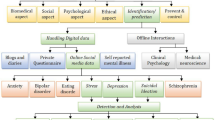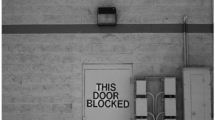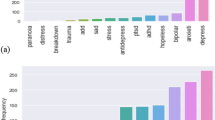Abstract
Social network analytics in health-care is recently catching-all as world is recovering from Covid-19 pandemic and when it comes to dealing with mounting mental health problems in the online community. A technical breakthrough to quickly address this issue is a big bet on researchers to deliver better intelligent mental health scale and support in mental distress risk management. In this paper we aim to build four artificial-intelligence driven models by blending the power of two dominant deep learning neural networks for explaining and predicting mental distress risk in the crowd-sourced online community. The models are simulated using a novel feature construct, which is a combination of numerical and textual data. The numerical data are realized by encoding social networking sites behavior and physical, social, cognitive experiences as part of three axes of psychological distress (depression, anxiety and stress). The textual part of data is made up of social network comments mined to acquire mental distressed cues by applying feature extraction techniques such as word embeddings and glove embeddings techniques. With the hyper-parameter tuning of models, we attained excellent performance (accuracy ~ 99.20%) which proves the efficacy of the proposed hybrid mental distress prediction model well with respect to accuracy in comparison to other related recent existing models with a boost of 0.20%. Our experimental results offer a robust model wherein we achieved zero false positive cases, attained 100% precision and excellent F1 measures. Additionally, we validated our results by using state-of-the-art technique BERT on different ground truth dataset i.e.,, Indian tweets to explore the tweets for psychological-distress prediction. Thus, we present an effectual automated tool for treatment activation of mental distress and supporting decisions in fostering the mental health of online society.









Similar content being viewed by others
Data availability
Data will be made available upon reasonable request for further study in this area of research within the limitations of the informed consent by the corresponding author upon acceptance from the co-author.
References
Abd Rahman R, Omar K, Mohd Noah SA, Mohd Danuri MSN (2018) A survey on mental health detection in online social network. Int J Adv Sci Eng Inform Technol 8:1431. https://doi.org/10.18517/ijaseit.8.4-2.6830
Ahmed S, Abu Yousuf M, Monowar MM, Hamid A, Alassafi MO (2023) Taking all the factors we need: a multimodal depression classification with uncertainty approximation. IEEE Access 11:99847–99861
Ahmed A, Yousuf M (2021) Sentiment analysis on bangla text using long short-term memory (LSTM) recurrent neural network. pp 181–192. doi https://doi.org/10.1007/978-981-4673-4_16
Amanat A, Rizwan M, Javed AR, Abdelhaq M, Alsaqour R, Pandya S, Uddin M (2022) Deep learning for depression detection from textual data. Electronics 11(5):676. https://doi.org/10.3390/electronics11050676
Andreassen CS, Torsheim T, Brunborg GS, Pallesen S (2012) Development of a facebook addiction scale. Psychol Rep 110(2):501–517. https://doi.org/10.2466/02.09.18.PR0.110.2.501-517
Bazarova NN, Choi YH, Schwanda Sosik V, Cosley D, Whitlock J (2015) Social sharing of emotions on facebook: channel differences, satisfaction, and replies. In: proceedings of the 18th ACM conference on computer supported cooperative work & social computing, pp 154–164. https://doi.org/10.1145/2675133.2675297
Belfin RV, Kanaga EGM, Kundu S (2020) Application of machine learning in the social network. Recent advances in hybrid metaheuristics for data clustering. Wiley, New Jersey, pp 61–83. https://doi.org/10.1002/9781119551621.ch4
Chancellor S, De Choudhury M (2020) Methods in predictive techniques for mental health status on social media: a critical review. Npj Dig Med 3(1):43. https://doi.org/10.1038/s41746-020-0233-7
Chandra R, Kulkarni V (2022) Semantic and sentiment analysis of selected bhagavad gita translations using BERT-based language framework. IEEE Access 10:21291–21315. https://doi.org/10.1109/ACCESS.2022.3152266
Chen LL, Magdy W, Wolters MK (2020) The effect of user psychology on the content of social media posts: originality and transitions matter. Front Psychol 11:1024. https://doi.org/10.3389/fpsyg.2020.00526
Chen L, Xia C, Sun H (2020b) Recent advances of deep learning in psychiatric disorders. Precis Clin Med 3(3):202–213. https://doi.org/10.1093/pcmedi/pbaa029
Cho G, Yim J, Choi Y, Ko J, Lee S-H (2019) Review of machine learning algorithms for diagnosing mental illness. Psychi Invest 16(4):262–269. https://doi.org/10.30773/pi.2018.12.21.2
Cong Q, Feng Z, Li F, Xiang Y, Rao G, Tao C (2018) X-A-BiLSTM: a deep learning approach for depression detection in imbalanced data. In: 2018 IEEE international conference on bioinformatics and biomedicine (BIBM). https://doi.org/10.1109/BIBM.2018.8621230
Coppersmith G, Leary R, Crutchley P, Fine A (2018) Natural language processing of social media as screening for suicide risk. Biomedical Informatics Insights 10:1178222618792860. https://doi.org/10.1177/1178222618792860
D’Alfonso S (2020) AI in mental health. Curr Opin Psychol 36:112–117. https://doi.org/10.1016/j.copsyc.2020.04.005
De Choudhury M, Counts S, Horvitz E (2013) Social media as a measurement tool of depression in populations. Proc Ann ACM Web Sci Conf WebSci. 13:47–56. https://doi.org/10.1145/2464464.2464480
Garcia-Ceja E, Riegler M, Nordgreen T, Jakobsen P, Oedegaard KJ, Tørresen J (2018) Mental health monitoring with multimodal sensing and machine learning: a survey. Pervasive Mob Comput 51:1–26. https://doi.org/10.1016/j.pmcj.2018.09.003
Ghosh T, Palash MIA, Yousuf MA, Hamid MA, Monowar MM, Alassafi MO (2023) A robust distributed deep learning approach to detect alzheimer’s disease from MRI images. Mathematics 11(12):12. https://doi.org/10.3390/math11122633
Ghourabi A, Mahmood MA, Alzubi QM (2020) A hybrid CNN-LSTM model for SMS spam detection in Arabic and English messages. Future Internet 12(9):156. https://doi.org/10.3390/fi12090156
Gkotsis G, Oellrich A, Velupillai S, Liakata M, Hubbard TJP, Dobson RJB, Dutta R (2017) Characterization of mental health conditions in social media using informed deep learning. Sci Rep 7(1):45141. https://doi.org/10.1038/srep45141
Glaz AL, Haralambous Y, Kim-Dufor D-H, Lenca P, Billot R, Ryan TC, Marsh J, DeVylder J, Walter M, Berrouiguet S, Lemey C (2021) Machine learning and natural language processing in mental health: systematic review. J Med Internet Res 23(5):e15708. https://doi.org/10.2196/15708
Haque UM, Kabir E, Khanam R (2021) Detection of child depression using machine learning methods. PLoS ONE 16(12):e0261131. https://doi.org/10.1371/journal.pone.0261131
Hochreiter S, Schmidhuber J (1997) Long short-term memory. Neural Comput 9(8):1735–1780. https://doi.org/10.1162/neco.1997.9.8.1735
Husseini Orabi A, Buddhitha P, Husseini Orabi M, Inkpen D (2018) Deep learning for depression detection of twitter users. In: proceedings of the fifth workshop on computational linguistics and clinical psychology: from keyboard to clinic. pp 88–97. doi https://doi.org/10.18653/v1/W18-0609
Iannotti RJ, Janssen I, Haug E, Kololo H, Annaheim B, Borraccino A (2009) Interrelationships of adolescent physical activity, screen-based sedentary behavior, and social and psychological health. Int J Public Health 54(Suppl 2):191–198. https://doi.org/10.1007/s00038-009-5410-z
Jo H, Kim S-M, Ryu J (2017) What we really want to find by Sentiment Analysis: the relationship between computational models and psychological state. ArXiv.
Kanaan R, Haidar B, Kilany R (2021) Detecting mental disorders through social media content. In: 2021 IEEE 3rd international multidisciplinary conference on engineering technology (IMCET), 23–28. https://doi.org/10.1109/IMCET53404.2021.9665555
Karim F, Oyewande AA, Abdalla LF, Ehsanullah RC, Khan S (2020) Social media use and its connection to mental health: a systematic review. Cureus 12(6):15. https://doi.org/10.7759/cureus.8627
Kim J, Lee J, Park E, Han J (2020) A deep learning model for detecting mental illness from user content on social media. Sci Rep 10:11846. https://doi.org/10.1038/s41598-020-68764-y
Kim J, Lee D, Park E (2021) Machine learning for mental health in social media: bibliometric study. J Med Internet Res 23(3):e24870. https://doi.org/10.2196/24870
Kour H, Gupta MK (2022) An hybrid deep learning approach for depression prediction from user tweets using feature-rich CNN and bi-directional LSTM. Multim Tools Appl. https://doi.org/10.1007/s11042-022-12648-y
Kumnunt B, Sornil O (2020) Detection of depression in thai social media messages using deep learning. In: proceedings of the 1st international conference on deep learning theory and applications, pp 111–118. doi https://doi.org/10.5220/0009970501110118
LeCun Y, Bengio Y (1995) Convolutional networks for images, speech, and time series. In: Arbib MA (ed) Handbook of brain theory and neural networks. MIT Press, Cambridge, p 3361
Lin H, Jia J, Qiu J, Zhang Y, Shen G, Xie L, Tang J, Feng L, Chua T-S (2017) Detecting stress based on social interactions in social networks. IEEE Trans Knowl Data Eng 29(9):1820–1833. https://doi.org/10.1109/TKDE.2017.2686382
Lovibond PF, Lovibond SH (1995) The structure of negative emotional states: comparison of the depression anxiety stress scales (dass) with the beck depression and anxiety inventories. Behav Res Ther 33(3):335–343. https://doi.org/10.1016/0005-7967(94)00075-u
Mental health in Asia: The numbers. (n.d.). Retrieved October 27, 2021, from https://www.ourbetterworld.org/series/mental-health/support-toolkit/mental-health-asia-numbers
Nwankpa C, Ijomah W, Gachagan A, Marshall S (2018) Activation functions: comparison of trends in practice and research for deep learning (arXiv:1811.03378). arXiv. http://arxiv.org/abs/1811.03378
Rahman RA, Omar K, Mohd Noah SA, Danuri MSNM, Al-Garadi MA (2020) Application of machine learning methods in mental health detection: a systematic review. IEEE Access 8:183952–183964. https://doi.org/10.1109/ACCESS.2020.3029154
Ramírez-Cifuentes D, Largeron C, Tissier J, Baeza-Yates R, Freire A (2021) Enhanced word embedding variations for the detection of substance abuse and mental health issues on social media writings. IEEE Access 9:130449–130471. https://doi.org/10.1109/ACCESS.2021.3112102
Rezaeinia SM, Rahmani R, Ghodsi A, Veisi H (2019) Sentiment analysis based on improved pre-trained word embeddings. Expert Syst Appl 117:139–147. https://doi.org/10.1016/j.eswa.2018.08.044
Sagar R, Pattanayak RD, Chandrasekaran R, Chaudhury PK, Deswal BS, Lenin Singh RK, Malhotra S, Nizamie SH, Panchal BN, Sudhakar TP, Trivedi JK, Varghese M, Prasad J, Chatterji S (2017) Twelve-month prevalence and treatment gap for common mental disorders: findings from a large-scale epidemiological survey in India. Indian J Psych 59(1):46–55. https://doi.org/10.4103/psychiatry.IndianJPsychiatry_333_16
Saqib K, Khan AF, Butt ZA (2021) Machine learning methods for predicting postpartum depression: scoping review. JMIR Mental Health 8(11):e29838. https://doi.org/10.2196/29838
Shatte ABR, Hutchinson DM, Teague SJ (2019) Machine learning in mental health: a scoping review of methods and applications. Psychol Med 49(9):1426–1448. https://doi.org/10.1017/S0033291719000151
Silvera DH, Lavack AM, Kropp F (2008) Impulse buying: the role of affect, social influence, and subjective wellbeing. J Consum Mark 25(1):23–33. https://doi.org/10.1108/07363760810845381
Su C (2020) Deep learning in mental health outcome research: a scoping review. Transl Psych 26(1):116
Syaputra RA, Ali R (2022) Chapter Ten—Improving mental health surveillance over Twitter text classification using word embedding techniques. In: Jain S, Pandey K, Jain P, Seng KP (eds) Artificial intelligence, machine learning, and mental health in pandemics. Academic Press, NJ, pp 235–258. https://doi.org/10.1016/B978-0-323-91196-2.00014-4
Thieme A, Belgrave D, Doherty G (2020) Machine learning in mental health: a systematic review of the HCI literature to support effective ML system design. ACM Trans Comput Human Int (TOCHI), 27. https://www.microsoft.com/en-us/research/publication/machine-learning-in-mental-health-a-systematic-review-of-the-hci-literature-to-support-effective-ml-system-design/
Zeberga K, Attique M, Shah B, Ali F, Jembre YZ, Chung T-S (2022) A novel text mining approach for mental health prediction using Bi-LSTM and BERT model. Comput Intell Neurosci 2022:1–18. https://doi.org/10.1155/2022/7893775
Zhang L, Wang S, Liu B (2018) Deep learning for sentiment analysis: A survey. WIREs Data Min Knowl Discov 8(4):e1253. https://doi.org/10.1002/widm.1253
Zhang T, Schoene AM, Ji S, Ananiadou S (2022) Natural language processing applied to mental illness detection: a narrative review. Npj Dig Med 5(1):46. https://doi.org/10.1038/s41746-022-00589-7
Zhang Z, Lin W, Liu M, Mahmoud Rady M (2020) Multimodal deep learning framework for mental disorder recognition. pp 344–350. Doi https://doi.org/10.1109/FG47880.2020.00033
Funding
No funds, grants, or other support were received for conducting this study and preparation of the manuscript.
Author information
Authors and Affiliations
Contributions
The manuscript was designed and written together by all the three authors Dr. MKA, Dr. JS and AS. The experiment in the study was performed by the author Anju Singh, analysis and results were reviewed by the authors Dr. MKA and Dr. JS. All the authors contributed equally in this study and vouch for the results reported and protocol adherence during the study. All the three authors edited and approved the manuscript.
Corresponding author
Ethics declarations
Conflict of interest
There is no competing interest’s disclosure relevant to this study and related to any of the authors of this manuscript.
Additional information
Publisher's Note
Springer Nature remains neutral with regard to jurisdictional claims in published maps and institutional affiliations.
Rights and permissions
Springer Nature or its licensor (e.g. a society or other partner) holds exclusive rights to this article under a publishing agreement with the author(s) or other rightsholder(s); author self-archiving of the accepted manuscript version of this article is solely governed by the terms of such publishing agreement and applicable law.
About this article
Cite this article
Arora, M.K., Singh, J. & Singh, A. Development of intelligent system based on synthesis of affective signals and deep neural networks to foster mental health of the Indian virtual community. Soc. Netw. Anal. Min. 14, 20 (2024). https://doi.org/10.1007/s13278-023-01179-5
Received:
Revised:
Accepted:
Published:
DOI: https://doi.org/10.1007/s13278-023-01179-5




